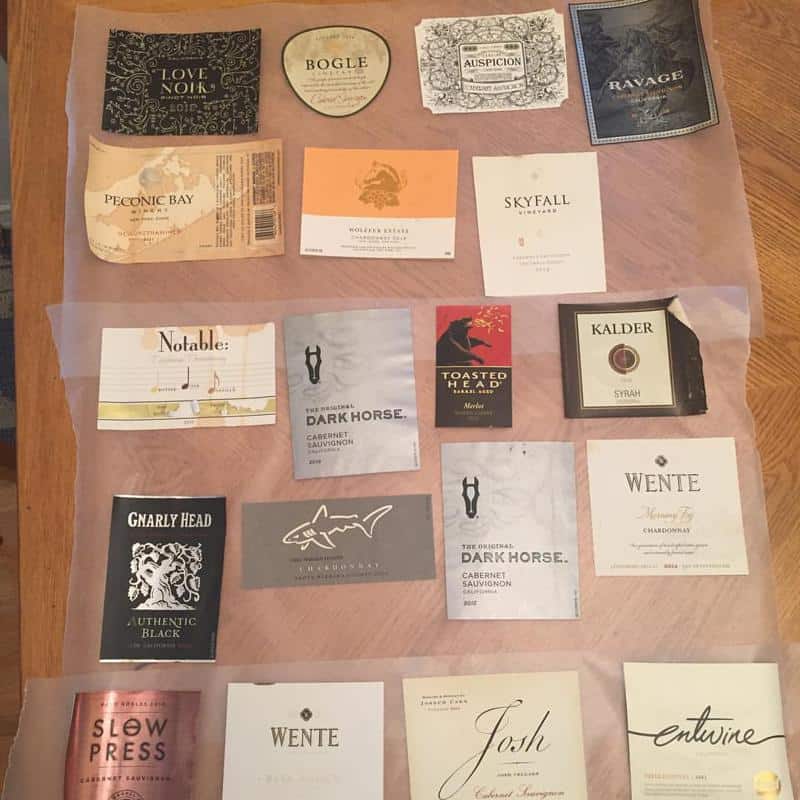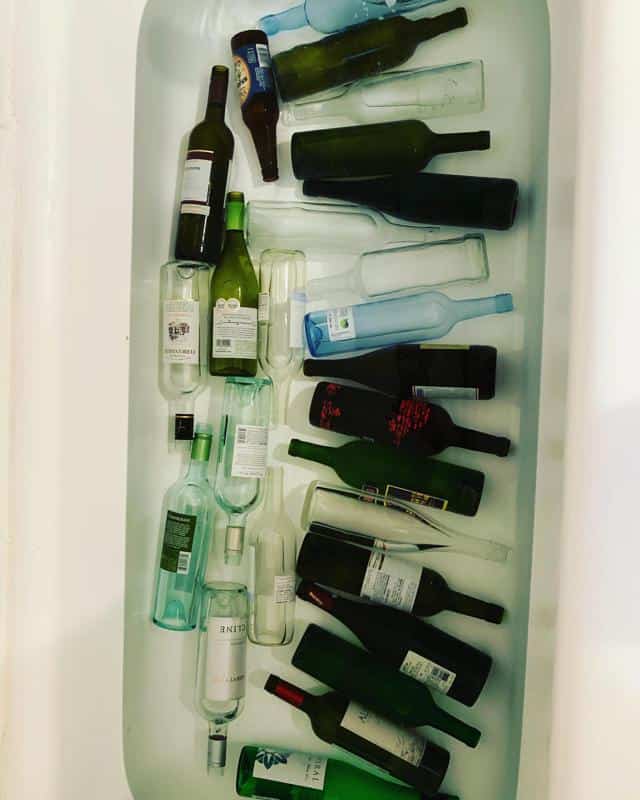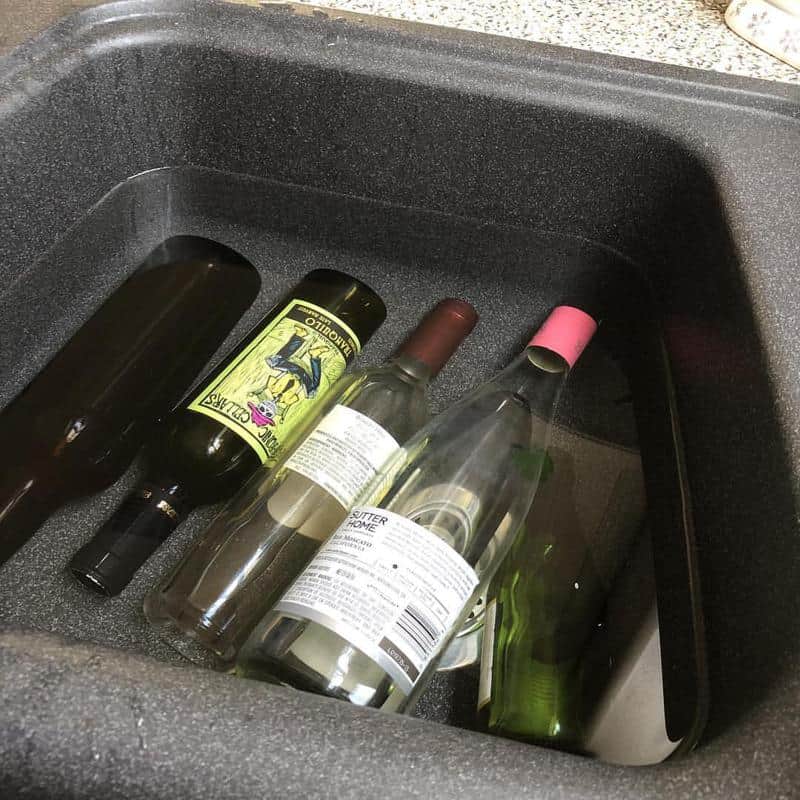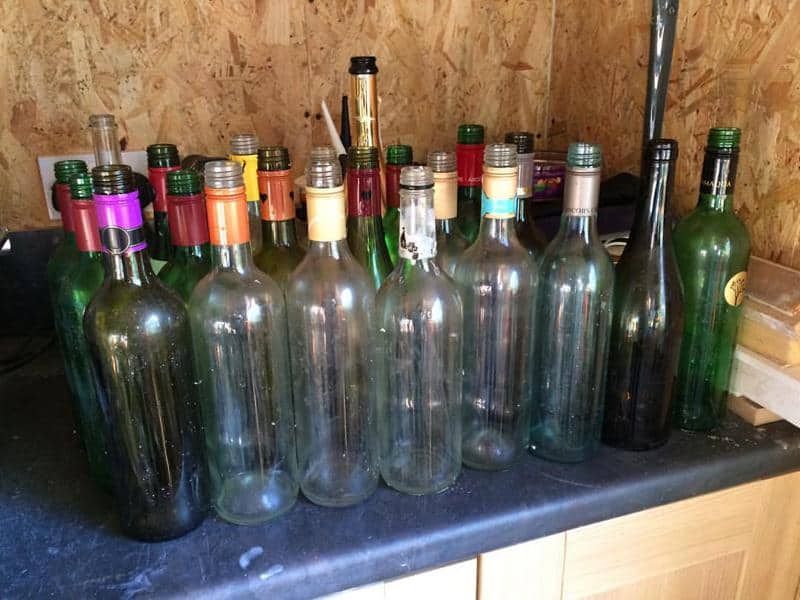how to remove labels from wine bottles
Removing wine bottle labels is perhaps to collect them for a scrapbook, a wine collage, or decorate a tasting room. Whether you are a DIY crafter, wine enthusiast, or just curious to find out how to remove labels from wine bottles, this guide will help you to learn the tricks for a perfect job.

Reasons to Remove Wine Bottle Labels
It may seem easy to remove wine labels, just peeling and pulling. However, pulling the label may result in tearing, which ruins the quality of the label. Therefore, it is vital to learn how to remove the label carefully to ensure it is worth keeping.
Many people throw away their empty wine bottles, not knowing how useful they can be. However, crafters and wine enthusiasts who keep wine journals may find the labels on the wine bottle quite fascinating.
Private-label winemakers remove labels from wine bottles to re-use them. Also, they create artwork, including coasters, bulletin boards, lampshades, portraits, or collages.
Factors to Consider Before Removing Wine Bottle Labels
If you intend to remove a label from a wine bottle, you first need to store the bottle away from any possible damage. Unfortunately, after parties, wine bottles are often discarded off into dustbins, and getting that label may prove quite a hassle for you.
Secondly, consider the type of label on your wine bottles. Determining the types of labels before attempting to remove them will help you decide what removal method to use.
Note: American wine bottles are more stubborn than European ones.
Deciding the Method of Label Removal for a Particular Bottle

Choosing the best method to remove a label from the wine bottle may be quite a daunting task. It is, therefore, crucial to check and determine the material that the label is made of.
Plastic labels or stickers are generally less permeable to water, meaning they do not readily absorb water. Therefore, you need to use heat or other physical means such as a razor blade. On the other hand, paper labels are more permeable to liquids, and water can be used in removing them.
Different kinds of polymers such as pressure-sensitive adhesives and water-based glues are used in sticking labels to wine bottles. Assuming you are not an adhesive expert, you can examine the label using a visual check to determine the glue used.
After carrying out your visual assessment, you can choose a removal method to give you the best results without damaging the bottle or the label. Using a razor blade or knife, lift a corner of the wine label to about ¼ inch to examine the adhesive layout.
A detergent and water-based method can be used in cases where the sticking substance looks like traditional glue. Physical methods such as peeling by hand or using a razor, or using heat can be used if the adhesive consistently looks like a sticker.
Methods to Remove Labels from Wine Bottles
You should try one of these methods to remove labels from wine bottles without damaging them. Depending on the type of paper and glue used, some methods may be faster and efficient than others. If one way does not work for you, move on to the next.
Wet Methods
Wet label removal methods are suited for removing wine labels from both full and empty bottles. If the label is attached using conventional glue, it is permeable to water, and wet removal methods can be applied.
1. The OxiClean Method
Oxiclean is great when removing labels. Soak the wine bottle in Oxiclean solution, and the label comes off pretty quickly.
It does an excellent job of removing stains and loosening rigid adhesives. This method has been tested on different labels, including paper, glue, and plastic bottles with stickers.
Here are the directions
- Pour ¼ cup of OxiClean into a bucket full of water (preferably one gallon).
- Immerse the wine bottle into the solution.
- Check after 30 minutes. You will likely find the wine label intact floating on water, depending on the kind of adhesive used on the label.
- Using a sharp knife, gently lift the edge of the label. If it does not peel off easily even after soaking, you may need to elbow grease. If this method does not work, you may need to apply a dry method.
- Put the wet label on a waxed paper to prevent the damp sticker from sticking on the counter.
Ajax, a standard household cleaning solution, may act as a perfect alternative to OxiClean when OxiClean is unavailable.
2. Baking Soda
Baking soda is a valuable household item essential in baking your favorite cookies and label removal on bottles.
It is the best method for removing labels on FULL wine bottles that does not affect the wine quality.
Here are the directions
- Soak the wine bottle in warm water with 5-10 tablespoons of baking soda for 30 minutes.
- After 30 minutes, the label will likely float on water. If not, remove the bottle and peel or wipe it off with a rag.
- If it becomes difficult, use a fingernail or steel wool to remove the remaining parts.
- Allow the label to dry completely before using it.
3. Hot Water

Hot water is one of the simplest removal methods and works well when removing wine labels from EMPTY wine bottles.
You can use two methods, filling the bottle with hot water or soaking the bottle in hot water.
You only need hot water, a towel, gloves, utility knife/razor blade, and steel wool (optional),
Here are the directions.
- Heat water using a kettle (or use hot water from the tap) and fill up your wine bottle. Remember to soak in the bottle in hot water first if using a kettle to prevent the glass from cracking from the sudden temperature change.
- Allow the hot water to stay for about 10 minutes. Wear your gloves since the bottle is hot and then use your fingers or steel wool to peel off the label. This is an easy clean method since the label does not get wet.
- Alternatively, you can simply soak the wine bottle in hot water and add a few drops of dishwasher detergent for about 10 -15 minutes.
- Dry the bottle using a towel and slowly peel off the label using the edge of a utility knife or razor blade
- Work slowly to avoid scratching or rubbing the damp paper as it can easily get damaged.
- Allow the label to dry overnight. If it curls up, you can flat press between pages of a heavy book only when completely dry.
Note: Soaking the bottle in very hot water may discolor the label, while more than two drops of dish soap may wrinkle or wilt it.
4. Ammonia
Ammonia solution is very effective in removing wine labels. However, you need to use this method in a well-ventilated room since the odor is quite harsh.
Follow the steps outlined below for positive results:
- Pour ¼ cup of ammonia in a gallon of water in a bucket.
- Immerse the wine bottle in the mixture and cover the bucket. Leave for 30 minutes.
- Put on gloves, and using a knife, gently lift the edge of the label and peel.
- Wash the bottle in cold water to remove the residue.
Dry Methods
Dry label removal methods you may want to try include:
5. Label Lift Method
If you want to keep the label in a wine journal or a photo collage as a souvenir, the label lift method is the perfect one. The Onephile Label Lift is one of the most popular label lifts and is available in packages of 10 or 50. If used correctly, the Onephile label lift gives the best results since the label comes off intact with no tears or creases. To use the label lift, simply follow the directions below:
- Gently apply the label lift over the wine label and rub for about 1-2 minutes using the backside of a spoon or any other hard object.
- Peel off the label.
- Trim the edges of the wine label using a scissor to achieve a neat appearance.
- Place the label in the wine journal or book.
- The result is an intact wine label that appears laminated on the downside.
6. Heat Method
You can use various heat methods while trying to remove wine labels such as oven and steaming.
Oven (baking)
This is an ideal method for those that do not like their wine label appearing laminated after removal. In addition, the oven (heat) method is convenient when the crafter wishes to make a wine label trivet or mount the wine label onto a photo collage or portrait for framing.
Ensure that there are no drops of wine left inside the bottle, and the foil cap or wax bottle cover is removed to prevent the release of a foul smell during heating.
Here are the directions
- Preheat the oven at 350 °F for 5 minutes.
- Put the wine bottle on a baking dish to prevent it from rolling around in the oven.
- Warm the empty wine bottle in the oven for 10 minutes to allow the adhesive on the label's back to melt.
- Wear gloves, take the bottle from the oven to a coolin rack, and assess if the label is ready for removal.
- Use the edge of a razor blade or utility knife under the label and start peeling it from one end (Do not pull off the label using your fingers since tears may occur).
- Allow the adhesive to air-dry or leave it face down on a sheet of parchment paper to dry.
Steaming
Steaming off the label is an excellent technique if you do not want to submerge in water.
Here are the directions to follow.
- Fill a large pot with water, about 1/3 full, and bring it to boil for about 15 to 20 minutes.
- Hold the empty wine bottle over the steam for about 30 minutes. Then, rotate the bottle a few times to expose both the front and back of the label to the steam.
- Make sure that you are wearing gloves since the glass will be hot. Then peel off the label using a razor blade or utility knife. Gently lift it off from one corner of the and once it loosens up, liftoff the entire label. You should have it in one piece.
- If it does not loosen up, hold the bottle over steam for another 10 or 15 minutes.
- Allow the label to air-dry overnight. Place it on a sheet of parchment paper with the adhesive side up.
7. Chill and Steam Method
The chill and steam method is almost similar to the heating method but less effective. Below are the procedures to follow.
- Place the wine bottle in the freezer for at least 25 minutes
- Then, remove it from the freezer and put it in a steamy humid room for at least 30 minutes
- After sweating the label, try to peel it off with your hands
If this does not work, try another method like baking soda.
Related Read: How Much Does a Bottle of Wine Weigh?
Conclusion

Removing wine labels may not be a walk in the park, but it is worth learning. You get to preserve wine labels for your scrapbook, wine journal or frame them in your house as souvenirs.
These methods require trial and error to find one that works perfectly. Unfortunately, results are rarely picture-perfect, and at times, you may need to try more than one.
However, you can always ask the winery to provide you with a pristine label, although it may not necessarily be from a bottle of wine you enjoyed.
Frequently Asked Questions
How Do You Get a Label Off a Wine Bottle Without Damaging it?
You can remove labels from wine bottles without damaging them using the heating or soaking removal methods above. However, peel the labels slowly and carefully to avoid them from tearing and creasing. A sharp utility knife and razor blade should be where necessary.
How Do You Remove Wine Labels With Vinegar?
Removing wine labels with vinegar works only to remove persistent adhesive off the wine bottle but does not preserve the label.
After removing the label efficiently, you can rub some vinegar on the bottle to remove any residue, including adhesive and paper, from the bottle.
Related Read: White Wine Vinegar Uses: Benefits, Cooking, Cleaning
How Do You Remove Stubborn Sticky Labels?
Some stubborn sticky labels will not come off the bottle intact. Thus, you may need to take a photo of the wine label and add the picture to your collection.
how to remove labels from wine bottles
Source: https://coastalwinetrail.com/how-to-remove-labels-from-wine-bottles/
Posted by: goodsoncined1957.blogspot.com

0 Response to "how to remove labels from wine bottles"
Post a Comment